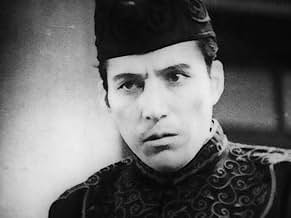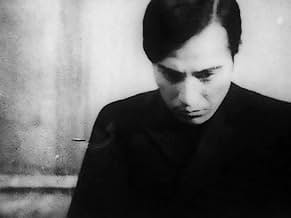The tragic tale of a woman who despite doing good where she can gets punished by society.The tragic tale of a woman who despite doing good where she can gets punished by society.The tragic tale of a woman who despite doing good where she can gets punished by society.
Featured reviews
Before I watched this, I re-watched some of the excellent documentary of director Kenji Mizoguchi, which is included on the Criterion Collection collection of Ugetsu, possibly Mizoguchi's best known film. Specifically, I went to the part where Takako Irie, the star of this film, speaks. The film was made in the mid 70's, and Ms. Irie was just about in her mid 60's (she has since passed on). She speaks in measured tones, but praises Mizoguchi. She seems shy and reserved. Also, for her years, she was very attractive, so the notion was she was probably a beauty when she made this film at the tender age of 22. Make no mistake, she was. The Water Magician is exactly as the title states, a movie starring Ms. Irie as a water magician traveling with a group of other circus type performers. The fact that this film still exists is a minor miracle. Many films of this time have been lost forever, which was at least partially due to the war, which is a true crime. This film survives, and it is phenomenal. I can't say enough about Takako Irie in this film. She is beautiful, she lights up the screen and gives a standout performance as the magician. Usually man hating, she falls for a carriage driver Kin-San, who she tries to help into becoming a lawyer by sending him money for his studies while she is on the road. This is sometimes a hardship for her, and they communicate by letter, but she is faithful to him. It sounds like a great love story, but wait. It is a Mizoguchi film, so you know there is going to be some kind of tragedy in this tale. Two notes about the film: The film was released as a silent film, but in the Benshi style, which means that people who went to the cinema in those days had a performer (the Benshi) describe the film to that, even doing all the silent lines of the film using different voices. In other words, the film is only kind of silent. The DVD, which I purchased from Japan, has a choice of two Benshi to listen to, as well as English subtitles. The second thing was mentioned earlier, that many films of that period were lost forever, but this one survives. The quality of this film is, at best, decent, but it doesn't matter. The film is so amazing, you barely notice the fact that the picture is just adequate. I am certain this is the best copy of the film available, and it is way more than enough. At the end, I thought of this more as a Takako Irie film than a Mizoguchi film. If you have any interest in Japanese cinema, this is required watching. The incredible acting performance of Takako Irie is mesmerizing. Rest in peace, Takako Irie. You were talented, a pioneer (she was producing films at this age. Name an American actress that produced films at age 22. Remember, this is 1933!), and flat out beautiful. Congratulations for this. Anyone who sees this film will know how special you were and are.
This has been called The Water Magician. My long forgotten Japanese makes me wish the title words Taki no shiraito might contain something like waterfall's white threads, though Taki is also, I think, stage name of the magician protagonist. Anyway, shiroi = white in my memory, and taki at least sometimes means waterfall. Without knowing the character in the film's titles, ito is at least a homonym for thread or, differently, intention. But I'm grabbing too "water" from the English title, so my whole notion may bunk.
The film is about kindhearted intentions unraveling disastrously (why I wanted thread). Spray fractalling. Foam on rocks. I'd seen all Mizoguchi's sound films, and two or three silents, conceivably even an unrestored print of this one, but last night with live benshi narration and mercifully little music it came alive as few Japanese silents have for me before. One thing to watch for in any Mizoguchi, silent or sound, but no less evident here than in the later work, is his continual reshaping, from within, of the standard 4:3 screen. Everyone knows later Japanese would become masters of scope.By continually repositioning, reframing, shifting focus depth, Mizoguchi does all they've done, if not more, as if the moderns' squashed frame limits rather than frees. One shot may have Taki a splinter against one full vertical edge. In another she'll be a layer between two other characters' layers, each a different distance from the lens, all moving perhaps independently, even if all three together occupy no more than three feet of depth. Shots from slightly overhead end some sections. In the latter third there's a shot of the coach driver, now an official of the magistrate, seated at a table with Taki, he on our right and she center-screen. It's a round table. Despite the seriousness of the occasion, the line of the table curves gently toward Taki. A rectangular table, a dark-against-pale-wall right-angle table corner right there, even with nothing, not a line of dialog or an expression, changed, would have made it a different scene. Early on we usually see Taki dressed for her act, heavily made up. She nearly always shares the screen, seldom fills it. She's first a burden to the serious-minded coach driver, so her approaches to him look coquettish. It's far from obvious that she's to be our hero. Films have been named for femmes fatales. Increasingly toward the end, her face fills the screen, the very features of her face seem to blossom. It turns into a peasant's face, exhausted but proud, at harvest time in a good year. Her whole being waxes before our eyes. The benshi, Midori Sawato, admitted, in Q and A, to having once thought the film was tragic, Taki ending in failure. But Sawato's present take on it, that Taki's heroic, is obvious in Mizoguchi's framings.
Another small note from the Q and A: the more confusing of two deaths in the film is from choking on a bit-off tongue. And finally, though I admitted above to that tiny bit of Japanese, it's little more than enough to know usually where sentences begin and end, where the parts of speech and proper names are but with nearly no vocabulary. You don't need to know the language to appreciate a benshi. If you get the chance, go see.
The film is about kindhearted intentions unraveling disastrously (why I wanted thread). Spray fractalling. Foam on rocks. I'd seen all Mizoguchi's sound films, and two or three silents, conceivably even an unrestored print of this one, but last night with live benshi narration and mercifully little music it came alive as few Japanese silents have for me before. One thing to watch for in any Mizoguchi, silent or sound, but no less evident here than in the later work, is his continual reshaping, from within, of the standard 4:3 screen. Everyone knows later Japanese would become masters of scope.By continually repositioning, reframing, shifting focus depth, Mizoguchi does all they've done, if not more, as if the moderns' squashed frame limits rather than frees. One shot may have Taki a splinter against one full vertical edge. In another she'll be a layer between two other characters' layers, each a different distance from the lens, all moving perhaps independently, even if all three together occupy no more than three feet of depth. Shots from slightly overhead end some sections. In the latter third there's a shot of the coach driver, now an official of the magistrate, seated at a table with Taki, he on our right and she center-screen. It's a round table. Despite the seriousness of the occasion, the line of the table curves gently toward Taki. A rectangular table, a dark-against-pale-wall right-angle table corner right there, even with nothing, not a line of dialog or an expression, changed, would have made it a different scene. Early on we usually see Taki dressed for her act, heavily made up. She nearly always shares the screen, seldom fills it. She's first a burden to the serious-minded coach driver, so her approaches to him look coquettish. It's far from obvious that she's to be our hero. Films have been named for femmes fatales. Increasingly toward the end, her face fills the screen, the very features of her face seem to blossom. It turns into a peasant's face, exhausted but proud, at harvest time in a good year. Her whole being waxes before our eyes. The benshi, Midori Sawato, admitted, in Q and A, to having once thought the film was tragic, Taki ending in failure. But Sawato's present take on it, that Taki's heroic, is obvious in Mizoguchi's framings.
Another small note from the Q and A: the more confusing of two deaths in the film is from choking on a bit-off tongue. And finally, though I admitted above to that tiny bit of Japanese, it's little more than enough to know usually where sentences begin and end, where the parts of speech and proper names are but with nearly no vocabulary. You don't need to know the language to appreciate a benshi. If you get the chance, go see.
Did you know
- Alternate versionsOriginally filmed as a silent movie with Japanese intertitles; an unceasing voiceover narration in Japanese has been added later.
- ConnectionsReferenced in Aru eiga-kantoku no shôgai (1975)
Details
- Release date
- Country of origin
- Languages
- Also known as
- The Water Magician
- Production companies
- See more company credits at IMDbPro
- Runtime
- 1h 50m(110 min)
- Color
- Sound mix
- Aspect ratio
- 1.37 : 1
Contribute to this page
Suggest an edit or add missing content






















